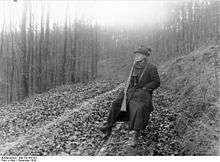Walter von Keudell
| Walter von Keudell | |
|---|---|
 | |
| Interior Minister of Weimar Republic | |
|
In office 20 January 1926 – 1 February 1927 | |
| Chancellor | Wilhelm Marx |
| Preceded by | Wilhelm Külz |
| Succeeded by | Carl Severing |
| Personal details | |
| Born |
17 July 1884 Castellamare di Stabia |
| Died |
7 May 1973 (aged 88) Bonn |
| Nationality | German |
| Religion | Protestant |
Walter von Keudell (17 July 1884 – 7 May 1973) was a German forest expert and politician. He served as interior minister of Germany between 1927 and 1928 during the period of the Weimar Republic.
Early life
Von Keudell was born in Castellamare di Stabia, Naples, Italy, on 17 July 1884.[1] He was the oldest son of Robert von Keudell, German diplomat and member of the Reichstags.[1] His mother was Alexandra von Grünhof.[2] He had a brother, Otto von Keudell, and a sister, Hedwig von Keudell.[3]
Career
Von Keudell started his career in the forest administration in Frankfurt in 1908.[4] He was a member of the Reichstags for the DNVP.[5] On 29 January 1927 he was appointed minister of interior of the German National People's Party's (DNVP) in the fourth cabinet of Prime Minister Wilhelm Marx.[5][6] Von Keudell was one of the three nationalist cabinet members.[7] Carl Severing replaced von Keudell as interior minister on 12 June 1928.[8]
In 1934, Hermann Göring appointed von Keudell as his deputy at the ministry of forest affairs.[9][10] Von Keudell was a member of the Nazi Party.[11] He was removed from office in 1936 when he refused to implement the forest policy of Göring which advocated the use of the mandatory cutting quota in private forests as in public forests.[10] Friedrich Alpers succeeded von Keudell in the post.[10]
In 1948, von Keudell joined the Christian Democratic Union.[4]
Personal life and death
Von Keudell's spouse was Johanna von Kyaw.[2] They married on 6 February 1912 and had four children, two sons and two daughters.[2] He was a devout Protestant.[12] He died in Bonn on 7 May 1973.[1]
References
- 1 2 3 "Walter von Keudell". Munzinger. 16 July 1973. Retrieved 17 October 2013.
- 1 2 3 "Walter von Keudell". The Peerage. Retrieved 17 October 2013.
- ↑ "Alexandra von Grünhof". The Peerage. Retrieved 17 October 2013.
- 1 2 "Keudell, Walter von". Das Bundesarchive. Retrieved 17 October 2013.
- 1 2 Hermann Beck (15 January 2011). The Fateful Alliance: German Conservatives and Nazis in 1933: The Machtergreifung in a New Light. Berghahn Books. p. 56. ISBN 978-0-85745-410-2. Retrieved 17 October 2013.
- ↑ Eastern, Northern and Central Europe. Annex: International Organisations. Walter de Gruyter. 1 January 2006. p. 785. ISBN 978-3-11-093910-1. Retrieved 17 October 2013.
- ↑ Ellen Lovell Evans (1981). The German Center Party, 1870-1933: A Study in Political Catholicism. Carbondale, IL: Southern Illinois University Press. – via Questia (subscription required)
- ↑ Walter H. Kaufmann (1953). Monarchism in the Weimar Republic. New York: Bookman Associates. Retrieved 17 October 2013. – via Questia (subscription required)
- ↑ Franz-Josef Brüggemeier; Mark Cioc; Thomas Zeller (2005). How Green Were the Nazis?: Nature, Environment, and Nation in the Third Reich. Ohio University Press. p. 31. ISBN 978-0-8214-1647-1. Retrieved 17 October 2013.
- 1 2 3 Thomas Lekan; Thomas Zeller (2005). Germany's Nature: Cultural Landscapes and Environmental History. New Brunswick, NJ: Rutgers University Press. Retrieved 17 October 2013. – via Questia (subscription required)
- ↑ Rüdiger Bergien, Die bellizistische Republik: Wehrkonsens und "Wehrhaftmachung" in Deutschland 1918-1933, Oldenbourg Verlag, 2012, p. 367
- ↑ Noel D. Cary (1996). The Path to Christian Democracy: German Catholics and the Party System from Windthorst to Adenauer. Cambridge, MA: Harvard University Press. Retrieved 17 October 2013. – via Questia (subscription required)
External links
| Wikimedia Commons has media related to Walter von Keudell. |